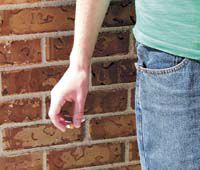| Smokers affected by amendments to Utah Indoor Clean Air Act
|
At Wednesday’s Price city council meeting, representatives of the Southeastern Utah Health District explained the amendments to the state’s indoor clean air act.
The representatives indicated that the health department plans to initiate enforcement of the clear air regulations in Price and Carbon County.
Health department officials will visit local businesses to give updated information about current smoking laws and ask the companies to create a policy dealing with the statute changes.
“We are working with each business individually to address their particular needs,” said Georgina Nowak of the local health district.
The department’s goal is to get all businesses in Carbon County to use standardized signs and have current smoking policies. According to health district officials, a business policy must address three issues:
•Underage tobacco use by employees.
The health department also stipulated that the company must ban all underage smoking for employees during work and break times on work site property.
•Outlining defined smoking areas for all other employees. Or go tobacco free.
•Smoking by customers and visitors to their business.
“We want to make sure that all employees both new and existing are given both their companies and the state’s regulations dealing with tobacco,” said Debbie Marvidakis also of the SEUDHD. She continued to say that, “It’s not fair to start citing people for violations of this policy without first educating them about it’s content.”
Amendments to the original laws that went active May 1, 2006 include:
Prohibiting smoking by providers in child care situations when youngsters are present.
Prohibiting smoking in public or private elementary or secondary school buildings, school grounds, education facilities and education facility property.
Smoking by adults is no longer permitted in designated smoking areas in private schools or educational facilities or on the grounds of private schools or facilities during non-school hours, pointed out health department officials.
The state statute also prohibits smoking in any building owned, rented, leased, or otherwise operated by a social, fraternal, or religious organization when used solely by the organization members or their guests of families.
For additional changes and more detailed information, Carbon County residents may read the Utah Criminal Code 26-38-1.
Residents with Internet access may also visit to http://www.tobaccofreeutah.org/2006uicaa.html.
In the federal government’s latest report, United States Surgeon General Richard Carmona states that there is no risk free level of exposure to secondhand smoke.
The report indicates that even brief exposure to secondhand smoke can cause immediate harm. The only way to protect people from the dangerous chemicals in secondhand smoke is to eliminate smoking indoors.
Secondhand smoke exposure can cause heart disease and lung cancer in adults and is a known cause of sudden infant death syndrome (SIDS), respiratory problems, ear infections and asthma report from the U.S. Surgeon General.
“The health effects of secondhand smoke exposure are more pervasive than we previously thought,” said Carmona. “The scientific evidence is now indisputable: secondhand smoke in not a mere annoyance. It is a serious health hazard that can lead to disease and premature death in children and nonsmoking adults.”
In addition, the federal government’s report notes that, because the bodies of infants and children are still developing, the youngsters are especially vulnerable to the poisons in secondhand smoke.
With the information in Carmona’s report and other states increasing tobacco legislation, Utah is following the trend.
For the first time, the Utah State Fair was tobacco free in 2006.
In addition, the U.S. Smokeless Tobacco Company was not present during the state fair’s rodeo. The absence was a major step in the anti-tobacco campaign as the company had been a long standing sponsor of the rodeo, according to local public health officials.
“I applaud the actions of the Utah State Fair in becoming a more family friendly event by dropping their sponsor deal with the USSTC and also for making the grandstands a smoke free environment,” said healthy lifestyles advocate cowboy Ted Hallisey. “We have been working on this for a while and I think it is great that the rodeo was tobacco-free this year.”
In conclusion, the U.S. Surgeon General’s report states that even the most sophisticated ventilation systems cannot completely eliminate secondhand smoke exposure and that only smoke-free environments afford full protection.
“State law must be followed and that is all we are trying to achieve.” finished Marvidikis.

